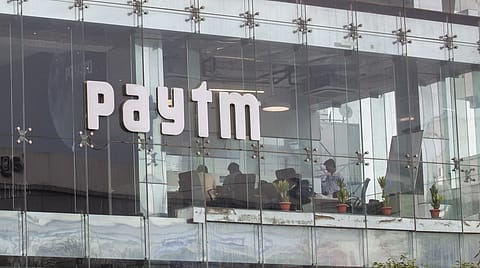Paytm jumps 7% on share buyback plan
The board of Paytm parent One 97 Communications will consider a share buyback proposal on December 13.

Shares of Paytm parent One 97 Communications rallied nearly 7% in opening deals on Friday after the fintech major said that its board will consider a share buyback proposal in a meeting on December 13. In comparison, the BSE Senesex was trading marginally higher at 62,575 levels, undermining firm cues from global peers.
“The board of directors of the company is scheduled to be held on Tuesday, December 13, 2022 to consider a proposal for buyback of the fully paid-up equity shares of the Company, in accordance with the applicable provision under the Companies Act, 2013 (including the rules and regulations framed thereunder), the Securities and Exchange Board of India (Buy-back of Securities) Regulations, 2018 (as amended), and other applicable laws,” Paytm said in a BSE filing on December 8.
“The management believes that given the company’s prevailing liquidity/ financial position, a buyback may be beneficial for our shareholders,” it added.
Reacting to the news, Paytm shares opened sharply higher, in an otherwise muted broader market, and gained as much as 6.7% to hit a high of ₹542.9 in the first hour of trade. On the volume front, 4.5 lakh shares changed hands over the counter as compared to the two-week average volume of 6.68 lakh stocks, while the market capitalisation (m-cap) climbed to ₹34,424.72 crore.
Paytm, which made its market debut on November 18 last year, is one the worst performer among recent large initial public offerings (IPOs), and has wiped off over 75% of investors' wealth (from its issue price of ₹2,150) since its listing. In the last one year, Paytm shares have delivered a negative return of 67% to its shareholders, while it has fallen 15% in the past six months. The stock hit an all-time low of ₹439.60 on November 24, 2022, while it touched a record high of ₹1,961.05 on its listing day.
Earlier this month, Patym founder and CEO Vijay Shekhar Sharma said in an analysts meeting that the company expects its blended net payment margin, difference between payment revenues and processing charges, to stabilise at 5 to 7 basis points (bps) due to increase in share of UPI in the payment business.
In the analysts presentation, Sharma said the company currently earns a net payment margin of 7 to 9 bps of gross merchandise value (GMV) on processing. "Of which UPI gives us 3 to 4 bps and other instruments give us 15 to 18 bps. Since UPI is growing faster than other instruments, we expect blended margin to stabilise at 5 to 7 bps," he added.
Sharma further stated that the company will trend lower as percentage of GMV because of higher UPI in mix, as well as routing and rate optimizations. “From this quarter, postpaid charges will be in payment cost (was in promotional cashback and incentives earlier) which will have no impact on contribution margin,” he said.
The company’s key cost drivers are finance incurred in building the platform and capital spent on expanding the fintech platform. “We believe we will improve profitability despite investments in sales & marketing,” the management said in its presentation.
During the second quarter of the current fiscal (Q2 FY23), the company spent ₹401 crore on building platform (people), which is expected to increase 10-15% YoY on the current base, unless it enters a new area of business. Besides, it invested ₹309 crore on marketing and sales, which are directly driven by revenue opportunities in the market.
Paytm made this analyst presentation days after the Reserve Bank of India refused to grant payment aggregator licence to its subsidiary, Paytm Payments Services Limited (PPSL). The RBI has asked PPSL to re-submit its payment aggregator (PA) application within 120 calendar days. The central bank has also barred PPSL from onboarding new online merchants.
(INR CR)